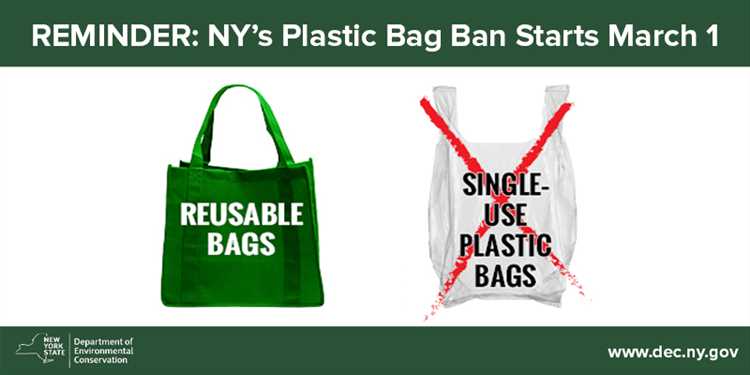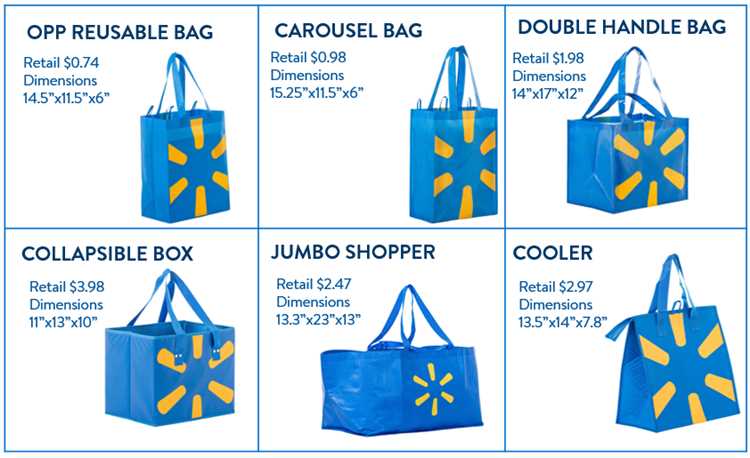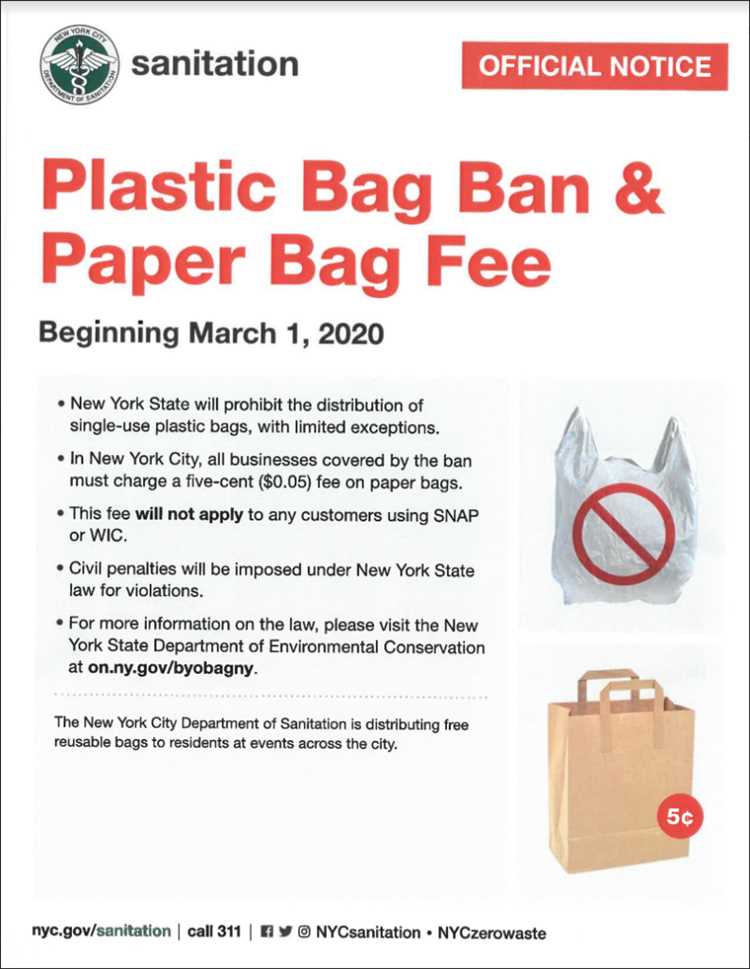
In a bold move to protect the environment and combat climate change, New York has made the decision to ban the use of paper bags throughout the state. This decision has sparked controversy and raised questions about its potential impact on businesses and consumers.
With the ban on plastic bags already in place, the decision to ban paper bags as well is seen as a significant step towards reducing the amount of waste generated by the state. It is estimated that New Yorkers use billions of single-use bags each year, which end up in landfills or as litter in our streets, parks, and waterways.
The decision to ban paper bags is based on several factors. Firstly, paper bags contribute to deforestation and the destruction of natural habitats. The production of paper bags requires cutting down trees, which not only removes valuable carbon dioxide-absorbing organisms but also disrupts ecosystems and threatens wildlife.
Furthermore, paper bags require a significant amount of energy and resources to produce. From the water and energy needed during the manufacturing process to the transportation and disposal of these bags, their overall environmental footprint is undeniable.
The ban on paper bags is expected to encourage consumers to embrace reusable alternatives such as cloth bags or sturdy, long-lasting tote bags. By adopting reusable bags, New Yorkers can significantly reduce their environmental impact and contribute to a cleaner and healthier state.
- The Environmental Impact of Paper Bags
- NY’s Efforts to Reduce Waste
- The Economic Costs of Paper Bag Production
- 1. Manufacturing Costs
- 2. Environmental Impact
- Alternative Solutions for Carrying Groceries
- The Benefits of Reusable Bags
- Q&A
- Why did NY decide to ban paper bags?
- What are the alternatives to paper bags?
- How will the ban on paper bags affect businesses?
- Are there any exceptions to the paper bag ban?
- How will the ban on paper bags be enforced?
- Why did NY decide to ban paper bags?
The Environmental Impact of Paper Bags
Paper bags have long been seen as a more eco-friendly alternative to plastic bags, but their production and disposal methods still have a significant impact on the environment.
1. Deforestation: Paper bags are primarily made from trees, which requires large-scale logging and deforestation. This leads to the destruction of natural habitats and the loss of biodiversity.
2. Energy Consumption: The production process for paper bags requires a significant amount of energy, mostly from non-renewable sources. This contributes to carbon emissions and global warming.
3. Water Usage: The production of paper bags also requires large amounts of water. The water used in the process is often contaminated with chemicals and pollutants, which can have detrimental effects on ecosystems.
4. Recycling Challenges: While paper bags can be recycled, the process is not as efficient as it is for plastic bags. The recycling process for paper bags still requires significant amounts of energy and water, and the end product is often of lower quality compared to virgin paper. This leads to a higher demand for new paper, perpetuating the cycle of deforestation.
5. Decomposition: While paper bags are biodegradable, they still take a considerable amount of time to decompose. In the meantime, they can contribute to litter and pollution, especially in marine environments.
In summary, while paper bags may seem like a more environmentally friendly choice, the overall impact of their production and disposal makes them less sustainable than we may think. This is why many states, including New York, have opted to ban or reduce the use of paper bags in favor of more sustainable alternatives.
NY’s Efforts to Reduce Waste

In an effort to combat the growing waste problem, New York has implemented several initiatives to reduce waste and promote sustainable practices. One of the key steps taken by the state is the recent decision to ban single-use paper bags.
The ban on paper bags is part of a broader strategy to encourage the use of reusable alternatives and reduce the reliance on disposable items. By prohibiting the distribution of paper bags, New York aims to reduce the amount of waste that ends up in landfills and littered in the environment.
In addition to the ban on paper bags, New York has also implemented a plastic bag ban, which was introduced in 2020. This ban aims to tackle the issue of plastic pollution, as plastic bags are a significant contributor to litter and adversely impact wildlife and ecosystems.
Furthermore, the state has introduced incentives and programs to encourage recycling and composting. These initiatives aim to divert waste from landfills and promote the proper disposal and recycling of materials. By encouraging residents and businesses to recycle and compost, New York hopes to significantly reduce the amount of waste that is disposed of improperly.
Another important aspect of New York’s waste reduction efforts is education and awareness campaigns. The state has launched several initiatives to educate the public about the importance of reducing waste and adopting sustainable practices. These campaigns aim to change behavior and encourage individuals to make environmentally conscious choices in their daily lives.
New York’s efforts to reduce waste and promote sustainable practices are crucial in addressing the environmental challenges faced by the state. By implementing bans on paper and plastic bags, promoting recycling and composting, and raising awareness about waste reduction, New York is taking proactive steps towards a cleaner and more sustainable future.
The Economic Costs of Paper Bag Production
The production of paper bags comes with a range of economic costs that are important to consider when evaluating the decision to ban them. These costs can have a significant impact on businesses, consumers, and the overall economy.
1. Manufacturing Costs
Producing paper bags requires the use of raw materials, such as wood pulp, water, and energy. These resources come at a cost, and as the demand for paper bags increases, so does the production cost. Additionally, the manufacturing process itself requires specialized machinery and skilled labor, contributing to the overall expenses.
2. Environmental Impact
The production of paper bags has a significant environmental impact. The extraction of wood pulp contributes to deforestation, which can result in the loss of biodiversity and disruption of ecosystems. The manufacturing process also produces greenhouse gas emissions and generates pollution through the use of chemicals, such as bleach and dyes.
Furthermore, recycling paper bags requires additional resources and energy, adding to the economic and environmental costs. The need for recycling infrastructure and transportation further contributes to the overall expenses.
The economic costs of paper bag production extend beyond the manufacturing process itself. Businesses that provide paper bags to consumers often bear the expense of providing them free of charge. This cost is often factored into the prices of goods, ultimately impacting consumers who may end up paying more for products as a result.
Overall, the economic costs of paper bag production are not insignificant. When considering the decision to ban paper bags, it is crucial to evaluate these costs alongside the environmental benefits in order to make an informed decision.
Alternative Solutions for Carrying Groceries
With the ban on paper bags in New York, it’s important to explore alternative solutions for carrying groceries. Here are some ideas:
Reusable Bags: One of the most popular options is to invest in reusable bags. These bags are made of durable materials like canvas or recycled plastic and can be used multiple times. They often have reinforced handles and are easy to clean, making them a convenient choice for carrying groceries.
Trolley Bags: Another option is to use trolley bags, which are specially designed to fit inside shopping carts. These bags have separate compartments to keep groceries organized and can be easily removed and carried to your car or home. Trolley bags are a great choice for those who prefer a structured and organized way of carrying groceries.
Foldable Shopping Bags: If you prefer something compact and easy to store, foldable shopping bags are a great option. These bags can be folded into a small pouch and easily fit in your purse or pocket. They are lightweight and convenient to carry, making them a practical solution for spontaneous grocery shopping trips.
Basket or Crate: For those who prefer a more traditional approach, using a basket or crate can be a suitable alternative. These sturdy containers can be lined with a reusable bag or simply used on their own to carry groceries. Baskets and crates are particularly handy for farmers market trips or when you’re picking up a smaller number of items.
Cart with Wheels: If you frequently shop in bulk or have difficulty carrying heavy bags, a cart with wheels might be the best choice for you. These carts are designed to handle large loads and can be easily maneuvered. They often come with a handle and can be folded for storage when not in use.
DIY Options: If you’re feeling creative, there are plenty of DIY options for carrying groceries. You could repurpose old backpacks, create your own fabric bags from old t-shirts, or even make your own shopping cart using a bicycle trailer. The possibilities are endless!
Conclusion: While the ban on paper bags may be inconvenient for some, there are numerous alternative solutions for carrying groceries. Reusable bags, trolley bags, foldable shopping bags, baskets or crates, carts with wheels, and DIY options all provide practical and eco-friendly ways to transport your groceries. Whether you prefer structure, convenience, compactness, or creativity, there is a solution out there for everyone.
The Benefits of Reusable Bags

Using reusable bags instead of paper bags has a number of benefits for both individuals and the environment.
First and foremost, reusable bags are much more durable and long-lasting compared to paper bags. While paper bags tear easily and often need to be replaced after just a few uses, reusable bags can withstand heavy loads and can be used over and over again. This not only saves money in the long run but also reduces the amount of waste produced.
Additionally, reusable bags are much more environmentally friendly compared to paper bags. The production of paper bags requires cutting down trees, which contributes to deforestation and habitat destruction. In contrast, reusable bags are typically made from materials like cotton or recycled plastics, which have a much lower environmental impact.
Moreover, using reusable bags helps to reduce the use of single-use plastics. Many paper bags are actually coated with plastic, which prevents them from being easily recycled. By using reusable bags, individuals can minimize their consumption of plastic and contribute to the reduction of plastic waste in landfills and oceans.
In conclusion, the benefits of using reusable bags are clear. They are more durable, environmentally friendly, and help to reduce the use of single-use plastics. By making the switch to reusable bags, individuals can make a positive impact on the environment and help to create a more sustainable future.
Q&A
Why did NY decide to ban paper bags?
NY decided to ban paper bags to reduce waste and promote the use of reusable bags. The ban aims to address environmental concerns and encourage individuals to make more sustainable choices.
What are the alternatives to paper bags?
The alternatives to paper bags include reusable bags, such as cloth or canvas bags, and plastic bags. However, the use of plastic bags is also being limited in some areas due to their negative environmental impact.
How will the ban on paper bags affect businesses?
The ban on paper bags may have both positive and negative effects on businesses. On one hand, businesses will be required to find alternative packaging options, which may result in additional costs. On the other hand, the ban may also lead to increased sales of reusable bags or other eco-friendly alternatives.
Are there any exceptions to the paper bag ban?
Yes, there are exceptions to the paper bag ban. Certain types of businesses, such as restaurants or pharmacies, may be exempt from the ban. Additionally, individuals with certain disabilities or medical conditions may also be exempt and allowed to use paper bags.
How will the ban on paper bags be enforced?
The ban on paper bags will be enforced through inspections and fines for businesses that fail to comply. The specifics of enforcement may vary by location, but generally, businesses will be required to switch to alternative packaging options and provide proof of compliance if requested by authorities.
Why did NY decide to ban paper bags?
NY decided to ban paper bags as a measure to reduce waste and promote the use of reusable bags. The ban aims to minimize the negative environmental impacts associated with the production and disposal of paper bags.